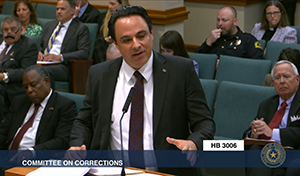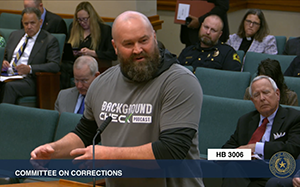The Texas House of Representatives Committee on Corrections heard public testimony April 16 on a bill to buy and install air-conditioning and heating systems in Texas prisons.
HB 3006, authored by Rep. Terry Canales, D-Edinburg, relates to the purchase and installation of climate-control systems at prison facilities operated by the Texas Department of Criminal Justice.
Five house bills related to the matter had been filed this session, but none had received a committee hearing until today.
“We support legislation that upholds the value and dignity of life as being made in the image of God our creator. We believe this bill does just that,” said John Litzler, director of public policy for Texas Baptists’ Christian Life Commission.
Phased installation over 10 years

The bill sets up a system where Texas Department of Criminal Justice will phase in climate control in Texas prisons over the next 10 years, which Canales noted was a “compromise” to expedite the TDCJ’s estimated timeline of 25 to 30 years for prisons in Texas to be fully air-conditioned at their current rate of installation.
The bill would allow for a phased installation of climate control not to exceed $100 million every two years and allows the use of inmate labor to reduce costs, Canales explained, noting some inmates have HVAC training.
He noted the bill’s phase-in plan means he “would expect to see a huge dent” in the number of prisons lacking air-conditioning by 2032.
Canales also pointed out not having climate control in Texas prisons is costing taxpayers millions of dollars. Legal action against the conditions has become a “cottage industry,” he noted, where the litigants virtually are guaranteed a win with “tons of litigation” every year.
“It’s already a precedent that you lose,” he said.
“And so, every time somebody gets hurt, every time there’s a stroke, we’re dishing out by the millions.”
“The situation is dire,” Canales said. The compromise bill only brings temperatures down to 85 degrees, he explained. But that reduction in temperature is the difference between life and death.
He urged committee members to visit a Texas prison to experience the conditions for themselves if they’ve never been. But, he warned them to wear a t-shirt and expect to leave drenched in sweat and with the taste of the stench of the disgusting conditions in their mouths.
Average 14 heat-related deaths per year
In her testimony, attorney Erica Grossman, who has participated in litigation related to air-conditioning in prisons, cited an average of 14 acknowledged heat-related deaths per year due to heat-related causes between 2001 and 2019.
Rep. Thresa Meza, D-Irving, questioned whether that number might represent an undercount of heat-related deaths. Grossman and other witnesses explained undercounts of heat-related deaths and injury are likely, citing Judge Robert Pittman’s comments in his 91-page ruling last month as evidence.
Grossman pointed out the court ruling in March called both the lack of air-conditioning in prisons and the TDCJ timeline of 30 years to mitigate conditions unconstitutional, without reservation.
As TDCJ had testified the only obstacle to installing climate control was funding, the ruling “invited the legislature to solve this funding problem now and solve it quickly” to implement the undisputedly necessary changes, she explained.
Treating pets better than humans
Conditions in Texas prisons are inhumane, Litzler suggested. He asserted Texas law devalues life when it requires temperatures in shelters where dogs and cats are present not to exceed 85 degrees for longer than two consecutive hours, while holding temperatures in state prisons to no such standards.
“We’re valuing dogs’ and cats’ comfort and safety over that of human beings,” Litzler lamented. “And that’s why we need this legislation in Texas, to promote a culture of life in our state.”
Litzler noted Texas Baptists minister through Philippi Church Ministries to more than 1,750 inmates, who meet in 350 groups in over 110 jails and prisons around the state, many of which are among the un-air-conditioned units.
Additionally, four of the six regional TDCJ prison chaplains in Texas are endorsed by Texas Baptists, and of all the chaplains in the TDCJ system, 1 in 4 has been endorsed by Texas Baptists, Liztler noted.
“We’re involved. We’re on the frontlines,” he observed, noting the current budget surplus means now is the time to address the need for climate control in Texas prisons.
‘What is the cost of a life?’
Other witnesses spoke of their experiences being incarcerated in these conditions or on behalf of those who have experienced the stifling heat indexes of many Texas prisons.

Jay Dan Gumm, president of Forgiven Felons, described fighting other inmates to get to coolers while he was incarcerated—not to drink the water, but to dip bedsheets in the icy water so he could tie the sheet to his hot metal bunk frame in each corner and place his fan at the end, creating his “own little bubble.”
He recalled heat-related fights at all four of the state prisons where he was held, with one leading to his solitary confinement. But when he was transferred to a private prison with air-conditioning, “I didn’t get in any fights,” he said.
It’s sad the only way climate control in Texas prisons is likely is through the courts, Gumm observed. He acknowledged pushback about the costs, but, he asked, “What is the cost of a life?”
If the mission of TDCJ isn’t just punitive, but rehabilitative: “How are we rehabilitating, at the same time killing some of the inmates because of the heat? … What is the cost of a life?” he asked again.
‘People are dying’
Jeff Edwards also spoke in favor of the bill, describing himself as “the cottage industry that was talked about.” He has been litigating this issue for the last 15 years, he said, noting he’s seen a “sea change” on this issue.
“As a civil rights issue, it’s black and white,” Edwards noted. “The courts have spoken. People are dying. People are suffering. It’s not even really up for debate.”
But, Edwards said, if it was ever analyzed from a cost-benefit perspective, it would be a “net positive” for the state on that front too. Adding air-conditioning will bring jobs, energy efficiency and savings, he said.
“It’s not just the right thing to do. It’s the smart thing to do,” Edwards asserted.
And as one of the lawyers in the current case, he said he wanted to tell the committee, “in no uncertain terms, this is going to happen,” because the court has made clear the conditions are unconstitutional.
No witnesses spoke against the bill. Brian Collier, executive director of Texas Department of Criminal Justice, provided neutral testimony.
Canales said he has been following this bill more than 10 years, HB 3006 is Canales’ third attempt to address the need for temperature control in Texas prisons in three years, after bills he introduced in the past two legislative sessions passed the House of Representatives, only to die in the Senate.
At the close of testimony, HB 3006 was left pending.
Editor’s note: The Committee on Corrections approved HB 3006 on April 23 by a vote of 7-1. The bill was reported favorably without amendments, according to the Texas Legislature online.















We seek to connect God’s story and God’s people around the world. To learn more about God’s story, click here.
Send comments and feedback to Eric Black, our editor. For comments to be published, please specify “letter to the editor.” Maximum length for publication is 300 words.